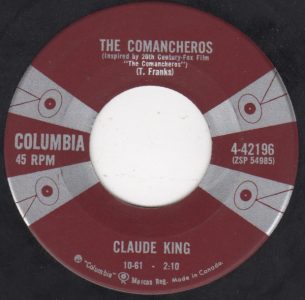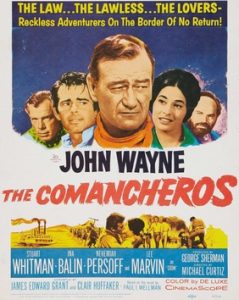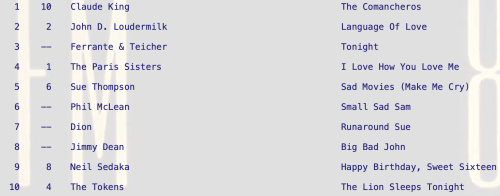#22: The Comancheros by Claude King
City: Calgary, AB
Radio Station: CFAC
Peak Month: December 1961
Peak Position in Calgary ~ #1
Peak position in Vancouver ~ #19
Peak Position on Billboard Hot 100 ~ #71
YouTube: “The Comancheros”
Lyrics: “The Comancheros”
Claude King was born in 1923 in rural Louisiana. He served in the United States Navy during World War II. After WWII King formed a band with two of his friends and were called the Rainbow Boys. The trio played around Shreveport in their spare time while working an assortment of other jobs. He joined the Louisiana Hayride, a television and radio show produced at the Shreveport Municipal Auditorium and broadcast throughout the United States and in the United Kingdom. He was on shows with Elvis Presley, Faron Young, Johnny Cash, Tex Ritter, Hank Williams, Johnny Horton, Jim Reeves, Webb Pierce, Kitty Wells and others. He recorded for Gotham Records with little success. But when he switched to Columbia Records, he had a hit with “Big River, Big Man”. It was both a country top 10 and a small pop crossover success. Next, Claude King released “The Comancheros”.
“The Comancheros” was inspired by the John Wayne film of the same name. The song was written by an obscure composer named Tommy Franks. His only other notable composition was “Honky Tonk Man”, which was a hit for Johnny Horton.

The film, The Comancheros, is set in 1843, in pre-Civil War Texas. Rogue gambler Paul Regret (Stuart Whitman) flees to avoid a death penalty after killing the son of a Louisiana judge in a duel. Paul Regret maintains that he intended to wound Judge Bouvier’s son, who arranged the duel, in the arm, but Bouvier sidestepped. Regret is eventually captured by Texas Ranger Captain Jake Cutter (John Wayne) after a tryst with a mysterious lady, Pilar Graile (Ina Balin). Paul Regret manages to escape, but is recaptured after a chance encounter with Cutter in a saloon.
While returning Regret to Louisiana, Cutter is compelled to join forces with the condemned man to fight the “Comancheros,” a large outlaw gang headed by a former officer who smuggles guns and whiskey to the Comanche Indians, to make money and keep the frontier in a state of violence. Cutter stops at a ranch owned by a friend, when the Comanche attack suddenly. During the attack, Regret jumps on a horse and flees, but instead of making a clean getaway, he returns with a company of Texas Rangers, who repulse the attack. Because of Regret’s act of valor, the Rangers and a Texas judge agree to perjure themselves, stating that Regret could not have been involved in the duel because he was helping them spy out the Comanchero’s supply line. Regret is then sworn in as an official Ranger.

After encountering one of the Comancheros’ suppliers and killing him in self-defense, Cutter and Regret take over his delivery wagon and infiltrate the self-sufficient Comanchero community at the bottom of a valley in the desert. Pilar reappears as the daughter of the ruthless Comanchero leader Graile (Nehemiah Persoff), who uses a wheelchair. He is soon killed by an old woman in the community after he orders the death of her son, and Cutter and the other Texas Rangers defeat the Comanche and Comancheros. Regret and Pilar leave together for Mexico, and Jake rides off into the sunset at the end of the film to rejoin the Ranger company. The film, The Comancheros, was based on the novel of the same name by Paul Wellman published in 1952.
The Comancheros were a group of 18th- and 19th-century traders based in northern and central New Mexico. They made their living by trading with the nomadic “Great Plains Indian” tribes in northeastern New Mexico, West Texas, and other parts of the southern plains of North America. The name “Comancheros” comes from the Comanche tribe, in whose territory they traded. They traded manufactured goods (tools and cloth), flour, tobacco, and bread for hides, livestock and slaves from the Comanche. In 1786, a treaty was signed between the Spanish governor in New Mexico and a Comanche war chief named Ecueracapa. This treaty opened the way for the full development of the Comanchero trade. When the U.S. government commenced its war against the Comanches after the American Civil War, their Comanchero allies and relatives assisted the Comanche resistance by supplying firearms and ammunition to the tribes.
The song “The Comancheros” did not appear in the 1961 film of the same name. But songwriter Tommy Franks was inspired to write a song after seeing the movie. The lyrics to “The Comancheros” bookend the story that unfolds in the film. The first verse introduces “Paul Regret from New Orleans,” and details how he shot a judge’s son and had to run. In the second verse, Paul Regret gets a one-way ticket on a paddlewheel boat. The song leaves out the part about the Texas Ranger who arrests Regret. The lyrics jump to a depiction of the Comancheros: “ridin’ through the night. Stealin’ and a-killin’ takin’ ever’thing in sight. Nothin’ left behind but the blood and the sand. The Comancheros are takin’ this land.” The lyrics depart from the story of how Paul Regret and the Texas Ranger arrive in the Comancheros secret town (in a wagon with 72 guns to sell). Instead, Tommy Franks writes of Paul Regret:
He rode into the Comanchero town, like a wild man on the run.
Before he’d leave they’d all be dead, they’d die by his blazin’ gun.
However, in the movie, Paul Regret is assisted with taking on the Comancheros with a whole posse of Texas Rangers.
“The Comancheros” was a top 10 country hit in late 1961 and crossed over into the popular chart. On the pop charts, “The Comancheros” climbed to #1 in Calgary, #5 in Spokane, WA, and #9 in Columbus, OH, and Toronto.
In 1962, Claude King had a number-one country hit titled “Wolverton Mountain”. It became a crossover pop hit and climbed to #6 on the Billboard Hot 100. The song was number-one in Calgary for five weeks, #1 for three weeks in Toronto, and #1 in Halifax, Fort William (ON), Port Arthur (ON), #2 in Vancouver (BC) and Ottawa, and #3 in Montreal.
King’s followup was “The Burning of Atlanta”, a song about the 1864 burning of the city by Union troops. It was a minor hit on the pop charts in Hamilton (ON), Montreal and Vancouver in the fall of 1962. It climbed to #10 on the Billboard country chart. A non-charting country single in the USA in 1963, “Scarlet O’Hara”, was a #7 hit on CFAC in Calgary. That year, Claude King appeared in concert on May 21 at the Pembroke Memorial Centre in Pembroke (ON).
Claude King kept on charting Top 20 hits on the country charts in the USA into the mid-60s. These include “I’ve Got the World by the Tail”, “Sheepskin Valley”, “Building a Bridge”, “Hey Lucille!” and “Sam Hill”. The latter was a Top Ten country hit in Canada in 1964 and a Top Ten pop hit in Halifax (NS). Claude King had two more Top Ten country hits titled “Tiger Woman” and “All for the Love of a Girl”. While in 1971, King had a Top Ten hit on the country chart in Canada with “Chip ‘N’ Dale’s Place”.
From the early Sixties to the late Seventies, Claude King released over thirty singles and five studio albums. He died at the age of 90 in 2013.
January 6, 2024
Ray McGinnis
References:
Stacey Plaisance, “Country singer-songwriter Claude King dies at 90,” Yahoo News, March 7, 2013.
“Claude King,” Hillbillymusic.com.


CFAC 960-AM, Calgary (AB) Top Ten | December 16, 1961

Missing the old CFUN survey’s.
Hi Ron,
Here are the nearly 1,450 songs I reviewed that were bigger hits in Vancouver compared to their chart runs on the Billboard Hot 100.
https://vancouversignaturesounds.com/countdown/ Click on any of those songs to see my previous reviews from 2016 to 2023.
I’m on to reviewing songs from other pop radio markets in Canada, based on request to do so.
But, only to add to what I’ve already showcased from CFUN, CKG, CKVN and CKWX in Vancouver.
Best
Ray
Impressive Ray.
Thanks Tom!
It was interesting to dig into Claude King’s background.